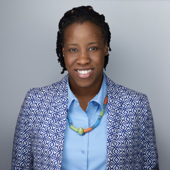
Josephine Godwyll, PhD
Pronouns: She/Her
Contact
Assistant Professor, Faculty of Kinesiology, Sport, and Recreation - Academic Programs
- jgodwyll@ualberta.ca
Overview
Area of Study / Keywords
Recreational Spaces Access Justice Well-being Active Transport
About
Josephine is an assistant professor, in the Faculty of Kinesiology, Sports, and Recreation (University of Alberta). Her research focuses on understanding the linkages between justice, well-being and access to recreational spaces. Her investigations highlight how just resource allocation, design processes and interactions in built and virtual environments, translate to well-being and access.
In the built environment, her research has focused on examining access through the linkages between varying constructs of well-being (i.e., individual and community) and just exchanges in gathering spaces (e.g., parks, community centers) and linkage spaces (e.g., bike lanes, side walks) . Outputs of such explorations comprise research publications and collaborations with the Maricopa Association of Governments (MAG) , the Design Studio for Community Solutions (DSCS) and Campus and Community Recreation services .
Pertaining to virtual environments she is pioneering research on linkages between well-being and access to recreational technology such as gamified e-learning platforms through the intersections between well-being and environmental justice constructs such as distributive, procedural and interactional justice.The focus of this work explores access and utilization of virtual learning spaces, as an outcome of resource distribution, inclusive processes and teaching and learning interactions.
She is also the founder of an ed-tech organization, Young At Heart Ghana, one of the avenues where she puts her research into practice by championing access to ed-tech resources, cognizant of the barriers and strengths that come to play in varying contexts. The organization has reached 10 000+ learners across Africa, through products like Lab and Library on Wheels systems – portable solar powered computer laboratories, Ananse e-learning suite – first African story-based STE(A)M app and Train the Trainer engagements – educational support services.
The research she has done through her organization has gained international interest and support evidenced by research grants and partnerships with University College London (UCL), Royal Academy of Engineers and Jacobs Foundation.
She was the first woman recipient of the “Engineering Excellence Award”, by the Ghana Institute of Engineers, a candidate for the 2020 Africa Prize for Engineering Innovation Award , a Coor fellow and a Mandela Washington fellow.
Research
Justice is a coveted ideal , yet one of the most difficult to grasp. This is because across varying populations there are multiple interests and concerns that need fair and equitable considerations, which are often contentious. In the world of leisure, the need for justice plays out in the barriers that have existed and continue to exist for socially vulnerable groups (e.g., persons experiencing disabilities,BIPOC, LGBTQI+ populations). Such populations experience constraints to leisure access on multiple fronts that need to be considered to facilitate fair and equitable opportunities for engagement.
Through her research lab Justice in Environments of Leisure Lab (JELL), Josephine leads research and knowledge mobilization on the barriers marginalized populations face in leisure participation. Specifically we focus on the barriers that arise from the encounters that take place across physical, virtual, technical, and social environments and outcomes on well-being that facilitate or inhibit access.We investigate the constraints marginalized populations face in accessing recreation through the interactions in relation to different environments and outcomes on well-being. The environments of focus include the physical environment (e.g., lack of resources, poorly maintained facilities), virtual environment (e.g., digital platforms), technical environment (e.g., limited community engagement in design) and social environment (e.g., user interactions).
Google Scholar - https://scholar.google.com/citations?user=oZIiR6wAAAAJ&hl=en
Research Gate - https://www.researchgate.net/profile/Josephine-Godwyll
Featured Publications
Josephine M. Godwyll, Christine N. Buzinde, David Manuel-Navarrete, Amy E. Frazier, Dave D. White, Orion Anderson
Community Development. 2024 July; 10.1080/15575330.2024.2382179
Josephine M. Godwyll, Christine N. Buzinde, Troy D. Glover, Dave D. White, Amy E. Frazier, David Manuel-Navarrete
World Leisure Journal. 2024 June; 10.1080/16078055.2024.2365223
Journal of Environmental Planning and Management. 2022 January; 10.1080/09640568.2021.2007862
Wellbeing, Space and Society. 2020 December; 10.1016/j.wss.2020.100014
International Journal of Environmental Research and Public Health. 2020 October; 10.3390/ijerph17217856
Journal of Sustainable Tourism. 2020 September; 10.1080/09669582.2020.1822368
Current Issues in Tourism. 2019 December; 10.1080/13683500.2019.1702001
Community Development Journal. 2019 October; 10.1093/cdj/bsy015
Decision Center for the Desert City. 2018 November;
View additional publications